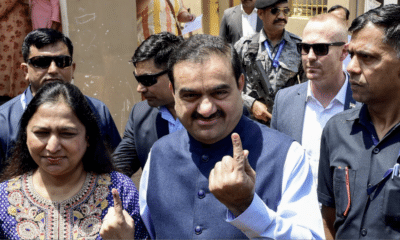News
FinMin Sources Deny Media Report on Probe Into SEBI Chief Amidst Hindenburg Allegations: What’s Next?
The recent allegations against SEBI Chairperson Madhabi Puri Buch by Hindenburg Research have sparked significant controversy, raising questions about the integrity of the market regulator and its head. However, in a swift response, sources within the Finance Ministry have refuted media reports suggesting a probe into Buch’s alleged involvement in offshore funds linked to the Adani Group scandal. The situation continues to evolve as the dust settles on these allegations.
Finance Ministry Responds to Allegations
On Tuesday, Finance Ministry sources dismissed reports that the government was considering forming a panel to investigate claims made by Hindenburg Research against Madhabi Puri Buch. These claims suggested that Buch and her husband had investments in obscure offshore funds allegedly used in the “Adani money siphoning scandal.” The ministry’s response comes after an earlier report by Informist, which cited a senior government official stating that a panel might be formed with representation from SEBI board members and government officials.
The Finance Ministry’s denial is significant, as it underscores the government’s stance on the matter and suggests that no formal investigation into Buch’s conduct is currently planned. This contradicts earlier media reports and signals a potential closing of ranks around Buch amidst the swirling controversy.
Hindenburg’s Allegations and the Wider Implications
Hindenburg Research, known for its aggressive short-selling strategies and high-profile investigations, made its latest allegations against Buch on August 10. The report claimed that Buch and her husband had investments in offshore funds tied to the Adani Group, a conglomerate that has been under scrutiny since Hindenburg’s explosive January 2023 report. That earlier report accused the Adani Group of financial misconduct and stock manipulation, leading to a significant market fallout.
Also read: Conflict of Interest or Just Coincidence? The SEBI Chief’s Controversial Connections with Blackstone
The latest allegations suggested that Buch had a conflict of interest that compromised SEBI’s ability to conduct an impartial investigation into the Adani Group. Both Buch and the Adani Group have denied these allegations, with SEBI maintaining that it is conducting its probe into the Adani matter without any bias.
Consultancy Firm Earnings: A New Controversy
Adding fuel to the fire, on August 16, Reuters reported that Buch’s earnings from a consultancy firm, Agora Advisory, which she co-founded with her husband, could be in violation of SEBI rules. The report noted that Buch held a 99% stake in the firm and earned Rs 3.71 crore during her tenure at SEBI, which may breach a 2008 policy prohibiting SEBI officials from earning income from other professional activities.
Buch has stated that she made all relevant disclosures regarding her involvement with Agora Advisory. However, the fact that she transferred her shares in Agora Partners to her husband only in March 2022, just before being appointed SEBI Chairperson, has raised concerns. Former top bureaucrat Subhash Chandra Garg described this as a “very serious” breach of conduct, further complicating the narrative around Buch’s tenure at SEBI.
What’s Next?
While the Finance Ministry’s denial of a probe into Buch’s conduct might bring some temporary relief, the cloud of allegations is unlikely to dissipate soon. Hindenburg Research’s claims, coupled with the concerns over Buch’s consultancy earnings, have placed the SEBI Chairperson under intense scrutiny.
The government’s decision not to launch a formal investigation may be seen as a vote of confidence in Buch’s leadership, but the allegations have already stirred a significant debate about the ethics and integrity of those in regulatory positions. As more details emerge, the situation may demand further clarifications from both Buch and the Finance Ministry.
In a financial ecosystem where trust and transparency are paramount, the unfolding events around SEBI’s top official are a stark reminder of the challenges regulators face in maintaining credibility amidst controversy. The implications of these allegations could have far-reaching consequences, not just for Buch but for the perception of SEBI as an impartial watchdog of India’s financial markets.










































